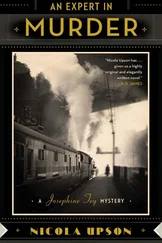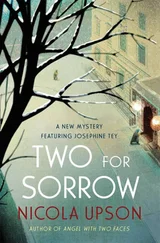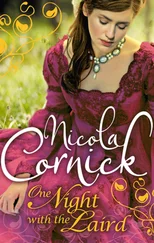The road they were on had parted from the sea, and they drove down into a small village, skirting a pretty, sheltered inner harbour before climbing again into open countryside. ‘How does Archie fit into life down here?’ Josephine asked. ‘He’s always been a bit vague about it whenever I’ve asked him.’
‘To be entirely honest, I’m not sure he knows himself how he fits in,’ Ronnie replied, ‘or if he does at all. You know that the Loe estate used to be in his father’s family, don’t you?’
Josephine shook her head, intrigued. ‘I thought his only connection with it was by marriage, through his mother.’
‘No, he only missed being Lord of the Manor by two or three generations. Our great-great-grandfathers were best friends out in the Indies together. The Penroses had the land and the Motleys had the money, so they came to a very sensible arrangement: Penrose transferred the estate and all responsibility for the upkeep of it to his friend, in exchange for a house and living on the estate in perpetuity. Everyone got what they wanted and the estate’s future was secured. It’s all worked out very nicely, even down to a uniting of the clans when Archie’s mother – Pa’s younger sister – married a Penrose.’ Josephine was quiet for a moment, trying to get the family tree straight in her mind while Ronnie went on. ‘So, in answer to your question, Archie fits in rather uncomfortably – he’s not the boss, but he’s not one of the workers either. And of course a Cambridge education and a job at the Yard haven’t helped bridge the gap. The law down here is very much a subjective thing, and something to be worked out privately.’
As the lane bent sharply round to the left, Ronnie took a right turn through some wooden gates, on to a private road shrouded in rhododendrons and variegated laurels. ‘Here we are, although I hope you’re not expecting the grand country house,’ she said. ‘I’m afraid it’s a rather haphazard affair, and the Penroses were very shrewd to get rid of it; the estate just eats money, and it’s the house that’s suffered – things get patched and mended in order of urgency, and the Forth Bridge doesn’t come into it. There’s always some sort of panic on. Don’t worry, though,’ she added reassuringly, ‘it is beautiful, and you’ll get the peace you need. Archie’s moved back in with us for a bit so that you can have the Lodge – it’ll be quieter for you to work in, and you can come up to the chaos whenever you feel like a bit of light relief.’
Josephine was about to thank her but, as they rounded another bend and emerged from the trees, the first glimpse of Loe Pool stopped her short. She had lived all her life just a few miles from Loch Ness and the magic of light on water held no novelty for her, but the Loe had a stillness and beauty all of its own. The combination of ornamental parkland in the foreground and a patchwork of fields to the rear gave the scene in front of her an intimate domesticity which could not have been more different from the ostentatious drama of the Monadhliath mountains, but which was no less magnificent. And at the centre of it all, flanked by rich, green woodland, was the lake itself – quiet, smoky-black at the edges where the sun could not reach, and drawing each disparate corner of the landscape effortlessly into one perfect whole.
Delighted, she turned to Ronnie and was moved to see that her cynical, world-weary friend had not become immune to its charms.
‘Come on, I’ll drop you at the Lodge for a wash and brushup,’ Ronnie said. ‘Wander over for dinner when you’re ready.’
Chapter Three
Nathaniel Shoebridge leant against the back door of the cottage that Harry had shared with his sisters, clutching a mug of cheap whisky and hoping that the solid stone walls might restore some of the strength which had deserted him the moment he stepped up to the lectern. He didn’t often drink, and the liquid burnt a harsh, sour path to the pit of his stomach, but he needed something to dull the memory of the service and the humiliation of standing in front of his own congregation without a single word of comfort to offer them. He had only been in the pulpit for a few minutes, but it had been long enough to remind him of how things used to be and he doubted that the confidence he had worked so hard to find would be quick to return.
His shyness had dogged him for years, clouding most of his childhood with a horror of being noticed that amounted almost to a phobia. He loved learning, but dreaded going to school in case he was singled out to answer a question or read in class, and the pretty, white washed laundry cottage that William Motley had converted into a schoolroom for the estate’s youngest children came to represent all that he feared most; just the sight of its slate roof through the trees was enough to send his stomach into spasms, and it made no difference that he was bright or that his classmates were friendly and his teacher kind. His education continued to be a wretched experience until, on Empire Day 1920, almost a year after he had transferred to the small secondary school in the village, everything changed. The teacher, Morveth Wearne, must have been in her fifties even then, but she had an intelligent, gentle manner that created its own discipline and the children were instantly at ease with her, Nathaniel included. As unorthodox in her lessons as in other areas of her life, Morveth had decided to follow the usual flag-waving and patriotic singing with a school play, and – in what Nathaniel later recognised as her own comment on colonialism – had chosen The Tempest . He had dreaded that day for weeks, knowing that there were not enough pupils in the class for him to avoid taking a part, and had even feigned illness to get out of it. Fortunately, his parents weren’t fooled; if they had been, he would have missed out on the most important day of his life. In his first encounter with Shakespeare, he found something that seemed more real to him than fear. So engrossed was he in the magic of the play and the beauty of the language that he lost all self-consciousness and, by the time he was called upon to speak Ferdinand’s opening lines, the words were the only thing that mattered.
After the play, and while the euphoria was still with him, Nathaniel had gone up to Morveth and asked nervously if she might give him something else to read. She looked at him for a long time, as if sensing how important this was to him, then smiled and took an old brown book with faded gold lettering from the back of the drawer in her desk. That was fifteen years ago, almost to the day, but he could still remember the faint smell of leather and the way the prayer book opened at particular passages that Morveth must have read over and over again. He had rushed through his tea that night, scarcely able to wait until he was alone in his room and able to take his time over turning its pages. Some of the words were difficult and strange at first, but the prose – which the Reverend Motley’s hurried, half-hearted delivery never brought to life in church – slowly began to speak to him through its rhythms, and he was fascinated by the markers of a man’s life which the different sections traced. From that day on, he read the book when he went to bed each night and it came to symbolise a magic even greater than Shakespeare; this, too, was theatre, but it was theatre for every day, written not just for actors but for ordinary people like him and his family and, as he grew older, he empathised with all the emotions it portrayed – anger and confusion as well as love and praise. He was drawn so strongly to these simple phrases, spoken for hundreds of years – phrases that offered a connection to the past as strong as the landscape he had grown up with – that he knew instantly what he wanted to do with his life, no matter how difficult it proved. He kept the leather-bound volume with Morveth’s blessing, and it was still the prayer book he used in church; he was forever grateful for the way in which its contents had shown him how to deal with the world and his place in it.
Читать дальше












